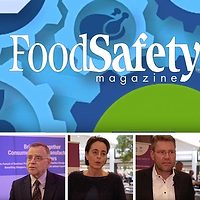GFSI 2022 Conference Highlights Food Safety Sustainability, Technology

Image credit: The Consumer Goods Forum's Global Food Safety Initiative
The 2022 Global Food Safety Initiative (GFSI) Conference, which took place March 29–31, brought hundreds of food safety professionals together to discuss this year’s theme of Delivering Impact for Safe Sustainable Food. Leaders from 50 nations were in attendance, including individuals representing the Coalition of Action of the Consumer Goods Forum (CGF), United Nations (UN) agencies, regulatory groups, and the food industry. The first in-person GFSI conference in two years took place in Barcelona, a port city, which is reminiscent of the shifts in the global supply chain that are impacting ports and other shipping hubs. Speakers discussed these shifts, among other topics, in plenaries, breakouts, and other sessions, collaborating on solutions for food safety issues that both predated and arose because of the COVID-19 pandemic.
The conference’s theme of Delivering Impact for Safe Sustainable Food reflected GFSI’s commitment to sustainability as a CGF member. The plenary “Breaking the Silos Between Food Safety and Sustainability” addressed challenges the industry has faced in trying to reconcile food safety and sustainability. In this session and others, experts addressed opportunities to simultaneously prioritize food safety and combatting issues such as climate change, food waste, and plastic pollution.
GFSI also emphasized the UN Sustainable Development Goals (SDGs), especially SDGs One (no poverty), Two (zero hunger), and Six (Clean Water and Sanitation). GFSI invited attendees to recommit to these goals in honor of UN World Food Safety Day on June 7th, and GFSI is conducting a survey to learn how its community will strive to meet SDGs. UN agencies represented at the conference included the World Health Organization, the World Food Program, the Food and Agriculture Organization, and the Codex Alimentarius Commission; GFSI maintains partnerships with these groups as part of its Race to the Top framework.
The conference gave room for GFSI local groups to convene as well. Representatives from local groups across seven regions discussed their individual realities and shared goals in a plenary called “World Cafe.” One of the most emphasized goals in this session was the local groups’ desires to attract more members for a greater geographic variety of representation and prioritization.
Another topic of importance that was emphasized throughout the conference was the accelerated adaptation of technologies in the food safety sector during the last two years, which was necessitated by the COVID-19 pandemic. Technological advancements which were once discussed as mere possibilities have now been accepted as parts of the industry’s reality, such as fully remote audits, food safety training through virtual reality, and the mainstream adoption of grocery e-commerce. In the plenary “Innovation Across the Food Safety Ecosystem,” the need for caution against placing too much trust in technology and the importance of real people in assuring food safety was discussed.
The necessity of individual experts in the food safety sector was its own topic of discussion, specifically regarding recruiting and training future food safety auditors. The plenary “GFSI’s Strategic Priorities” introduced GFSI’s new initiative to increase the number of food safety auditors by streamlining the qualification process with Professional Recognition Bodies. Breakouts and other sessions suggested ways to introduce food science to future generations so that they may decide to join the network of food safety professionals in their careers.
Finally, the GFSI Conference ended with a keynote that encouraged delegates to adopt strategies developed for outer space, and to consider how space explorers might learn from the food industry. Though it may seem a distant reality, keynote speaker and space systems researcher Angelo Vermeulen highlighted that space may soon become one of the food industry’s markets.
The host nation for GFSI’s 2023 conference will be the United States.
Looking for a reprint of this article?
From high-res PDFs to custom plaques, order your copy today!









